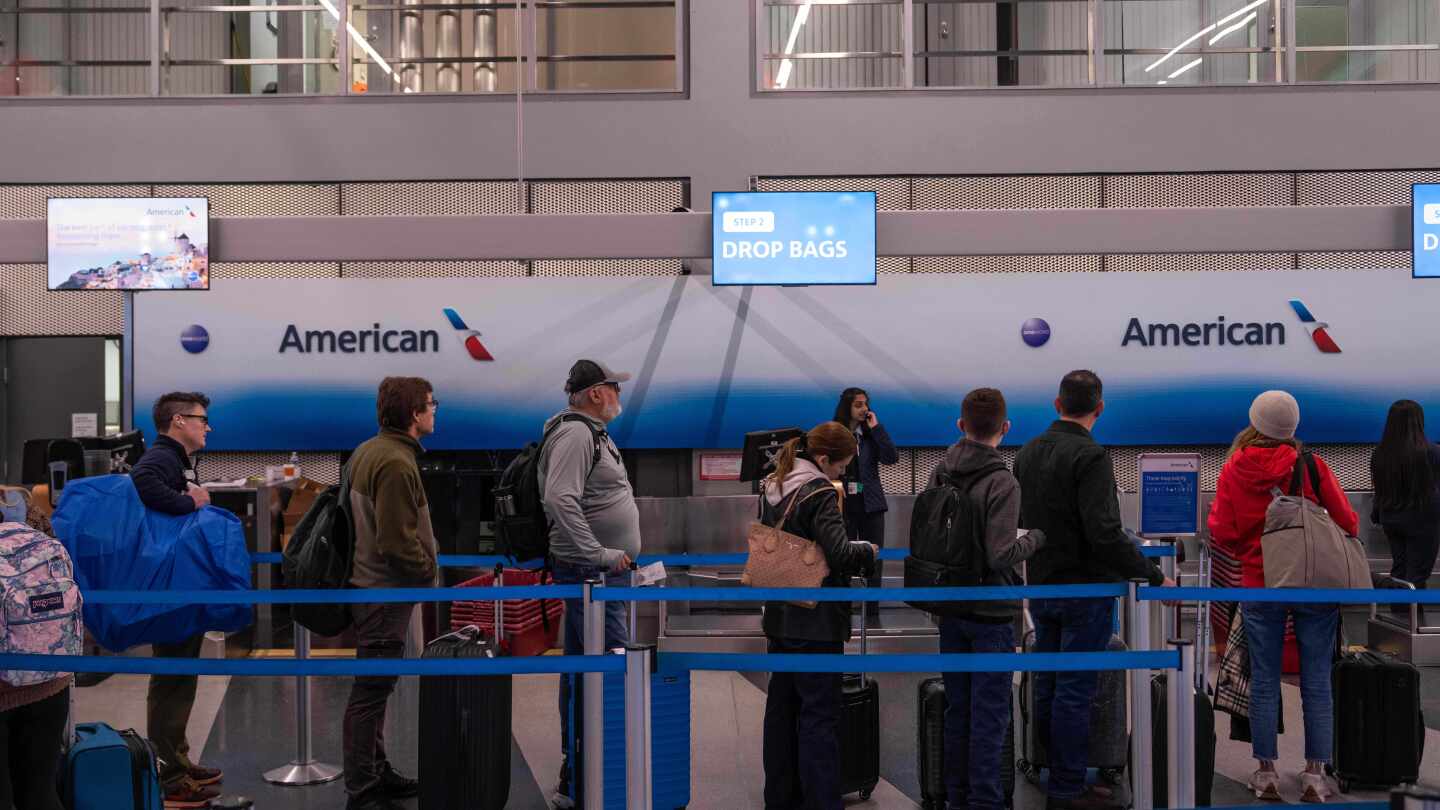\nThe partial US government shutdown is having a significant impact on air travel in the United States. According to reports, US airlines canceled more than 2,700 flights on Sunday alone, primarily due to the government shutdown and the Federal Aviation Administration’s (FAA) order to reduce air traffic at 40 of the nation’s busiest airports.\n\nThis slowdown is now in its third day and is starting to cause disruptions to travel plans for millions of Americans. The FAA has been working with airlines to minimize the impact, but it remains unclear how long this situation will continue.\n\nThe shutdown, which began on December 22nd, has already led to a significant increase in air traffic control staffing costs, as many FAA employees are furloughed without pay. This has resulted in a reduction of air traffic controllers available to manage the skies, leading to the increased cancellation rates.\n\nAirlines have been working with the FAA to reduce flight schedules and minimize disruptions, but it remains unclear how long this situation will continue. The Transportation Security Administration (TSA) has also reported an increase in wait times for security checkpoints, adding to the overall travel disruption.\n\nThe impact of the shutdown on air travel is not limited to the United States. Many countries rely on US airports and airlines, and disruptions to air traffic can have far-reaching consequences. As the situation continues to unfold, it remains unclear what the long-term effects will be.\n\nIn the meantime, travelers are advised to check with their airline for the latest flight information and to plan accordingly. The FAA and airlines are working to minimize disruptions, but the situation is fluid and subject to change.\n\nThe shutdown has already had significant economic implications, including a decline in consumer spending and a rise in unemployment claims. As the situation continues to unfold, it remains unclear what the long-term effects will be for the US economy.\n\nAs the partial government shutdown enters its third day, air travelers are bracing themselves for more disruptions. With no clear end in sight, it’s essential for travelers to stay informed and plan ahead.\n\nThe FAA has assured the public that it is working to minimize disruptions to air traffic, but the situation remains fluid and subject to change. As the shutdown continues, one thing is certain: air travelers will face challenges in the days ahead.\n\nWith millions of Americans affected by the shutdown, it’s essential for travelers to stay informed and plan accordingly. The FAA and airlines are working to minimize disruptions, but the situation is complex and subject to change.\n\nFor now, travelers can expect more cancellations and delays as the shutdown continues. As the situation unfolds, it’s crucial to check with your airline for the latest flight information and to be prepared for any changes in travel plans.\n\nThe impact of the government shutdown on air travel is a complex issue with far-reaching consequences. As the situation continues to unfold, one thing is certain: air travelers will face challenges in the days ahead.\n\nIn the midst of the shutdown, it’s essential to prioritize flexibility and adaptability when it comes to travel plans. With the FAA working to minimize disruptions, it’s crucial to stay informed and be prepared for any changes.\n\nThe US government shutdown is having a significant impact on air travel in the United States, with over 2,700 flights canceled on Sunday alone. As the situation continues to unfold, it remains unclear what the long-term effects will be for the US economy and the traveling public.\n\nFor now, travelers can expect more disruptions as the shutdown continues. With millions of Americans affected, it’s essential to stay informed and plan ahead.\n\nThe FAA has assured the public that it is working to minimize disruptions to air traffic, but the situation remains fluid and subject to change. As the shutdown continues, one thing is certain: air travelers will face challenges in the days ahead.\n\nWith the shutdown now in its third day, air travelers are bracing themselves for more disruptions. It’s essential to check with your airline for the latest flight information and to be prepared for any changes in travel plans.\n\nThe impact of the government shutdown on air travel is a complex issue with significant economic implications. As the situation continues to unfold, it remains unclear what the long-term effects will be for the US economy and the traveling public.\n\nFor now, travelers can expect more cancellations and delays as the shutdown continues. With millions of Americans affected, it’s essential to prioritize flexibility and adaptability when it comes to travel plans.\n\nThe FAA is working to minimize disruptions to air traffic, but the situation remains fluid and subject to change. As the shutdown continues, one thing is certain: air travelers will face challenges in the days ahead.\n\nWith the US government shutdown now in its third day, air travelers are facing more disruptions than ever before. It’s essential to check with your airline for the latest flight information and to be prepared for any changes in travel plans.\n\nThe impact of the shutdown on air travel is significant, with over 2,700 flights canceled on Sunday alone. As the situation continues to unfold, it remains unclear what the long-term effects will be for the US economy and the traveling public.\n\nFor now, travelers can expect more cancellations and delays as the shutdown continues. With millions of Americans affected, it’s essential to prioritize flexibility and adaptability when it comes to travel plans.\n\nThe FAA has assured the public that it is working to minimize disruptions to air traffic, but the situation remains fluid and subject to change. As the shutdown continues, one thing is certain: air travelers will face challenges in the days ahead.\n\nAs the US government shutdown enters its third day, air travelers are facing more disruptions than ever before. It’s essential to check with your airline for the latest flight information and to be prepared for any changes in travel plans.\n\nThe impact of the shutdown on air travel is complex, with significant economic implications. As the situation continues to unfold, it remains unclear what the long-term effects will be for the US economy and the traveling public.\n\nFor now, travelers can expect more cancellations and delays as the shutdown continues. With millions of Americans affected, it’s essential to prioritize flexibility and adaptability when it comes to travel plans.\n\nThe FAA is working to minimize disruptions to air traffic, but the situation remains fluid and subject to change. As the shutdown continues, one thing is certain: air travelers will face challenges in the days ahead.\n”
{
“headline”: “US Airlines Grounded by Government Shutdown, Canceling Over 2,700 Flights”,
“content”:
\nThe partial US government shutdown is having a significant impact on air travel in the United States. According to reports, US airlines canceled more than 2,700 flights on Sunday alone, primarily due to the government shutdown and the Federal Aviation Administration’s (FAA) order to reduce air traffic at 40 of the nation’s busiest airports.\n\nThis slowdown is now in its third day and is starting to cause disruptions to travel plans for millions of Americans. The FAA has been working with airlines to minimize the impact, but it remains unclear how long this situation will continue.\n\nThe shutdown, which began on December 22nd, has already led to a significant increase in air traffic control staffing costs, as many FAA employees are furloughed without pay. This has resulted in a reduction of air traffic controllers available to manage the skies, leading to the increased cancellation rates.\n\nAirlines have been working with the FAA to reduce flight schedules and minimize disruptions, but it remains unclear how long this situation will continue. The Transportation Security Administration (TSA) has also reported an increase in wait times for security checkpoints, adding to the overall travel disruption.\n\nThe impact of the shutdown on air travel is not limited to the United States. Many countries rely on US airports and airlines, and disruptions to air traffic can have far-reaching consequences. As the situation continues to unfold, it remains unclear what the long-term effects will be.\n\nIn the meantime, travelers are advised to check with their airline for the latest flight information and to plan accordingly. The FAA and airlines are working to minimize disruptions, but the situation is fluid and subject to change.\n\nThe shutdown has already had significant economic implications, including a decline in consumer spending and a rise in unemployment claims. As the situation continues to unfold, it remains unclear what the long-term effects will be for the US economy.\n\nAs the partial government shutdown enters its third day, air travelers are bracing themselves for more disruptions. With no clear end in sight, it’s essential for travelers to stay informed and plan ahead.\n\nThe FAA has assured the public that it is working to minimize disruptions to air traffic, but the situation remains fluid and subject to change. As the shutdown continues, one thing is certain: air travelers will face challenges in the days ahead.\n\nWith millions of Americans affected by the shutdown, it’s essential for travelers to stay informed and plan accordingly. The FAA and airlines are working to minimize disruptions, but the situation is complex and subject to change.\n\nFor now, travelers can expect more cancellations and delays as the shutdown continues. As the situation unfolds, it’s crucial to check with your airline for the latest flight information and to be prepared for any changes in travel plans.\n\nThe impact of the government shutdown on air travel is a complex issue with far-reaching consequences. As the situation continues to unfold, one thing is certain: air travelers will face challenges in the days ahead.\n\nIn the midst of the shutdown, it’s essential to prioritize flexibility and adaptability when it comes to travel plans. With the FAA working to minimize disruptions, it’s crucial to stay informed and be prepared for any changes.\n\nThe US government shutdown is having a significant impact on air travel in the United States, with over 2,700 flights canceled on Sunday alone. As the situation continues to unfold, it remains unclear what the long-term effects will be for the US economy and the traveling public.\n\nFor now, travelers can expect more disruptions as the shutdown continues. With millions of Americans affected, it’s essential to stay informed and plan ahead.\n\nThe FAA has assured the public that it is working to minimize disruptions to air traffic, but the situation remains fluid and subject to change. As the shutdown continues, one thing is certain: air travelers will face challenges in the days ahead.\n\nWith the shutdown now in its third day, air travelers are bracing themselves for more disruptions. It’s essential to check with your airline for the latest flight information and to be prepared for any changes in travel plans.\n\nThe impact of the government shutdown on air travel is a complex issue with significant economic implications. As the situation continues to unfold, it remains unclear what the long-term effects will be for the US economy and the traveling public.\n\nFor now, travelers can expect more cancellations and delays as the shutdown continues. With millions of Americans affected, it’s essential to prioritize flexibility and adaptability when it comes to travel plans.\n\nThe FAA is working to minimize disruptions to air traffic, but the situation remains fluid and subject to change. As the shutdown continues, one thing is certain: air travelers will face challenges in the days ahead.\n\nWith the US government shutdown now in its third day, air travelers are facing more disruptions than ever before. It’s essential to check with your airline for the latest flight information and to be prepared for any changes in travel plans.\n\nThe impact of the shutdown on air travel is significant, with over 2,700 flights canceled on Sunday alone. As the situation continues to unfold, it remains unclear what the long-term effects will be for the US economy and the traveling public.\n\nFor now, travelers can expect more cancellations and delays as the shutdown continues. With millions of Americans affected, it’s essential to prioritize flexibility and adaptability when it comes to travel plans.\n\nThe FAA has assured the public that it is working to minimize disruptions to air traffic, but the situation remains fluid and subject to change. As the shutdown continues, one thing is certain: air travelers will face challenges in the days ahead.\n\nAs the US government shutdown enters its third day, air travelers are facing more disruptions than ever before. It’s essential to check with your airline for the latest flight information and to be prepared for any changes in travel plans.\n\nThe impact of the shutdown on air travel is complex, with significant economic implications. As the situation continues to unfold, it remains unclear what the long-term effects will be for the US economy and the traveling public.\n\nFor now, travelers can expect more cancellations and delays as the shutdown continues. With millions of Americans affected, it’s essential to prioritize flexibility and adaptability when it comes to travel plans.\n\nThe FAA is working to minimize disruptions to air traffic, but the situation remains fluid and subject to change. As the shutdown continues, one thing is certain: air travelers will face challenges in the days ahead.\n”
{
“headline”: “US Airlines Grounded by Government Shutdown, Canceling Over 2,700 Flights”,
“content”:
\nThe partial US government shutdown is having a significant impact on air travel in the United States. According to reports, US airlines canceled more than 2,700 flights on Sunday alone, primarily due to the government shutdown and the Federal Aviation Administration’s (FAA) order to reduce air traffic at 40 of the nation’s busiest airports.\n\nThis slowdown is now in its third day and is starting to cause disruptions to travel plans for millions of Americans. The FAA has been working with airlines to minimize the impact, but it remains unclear how long this situation will continue.\n\nThe shutdown, which began on December 22nd, has already led to a significant increase in air traffic control staffing costs, as many FAA employees are furloughed without pay. This has resulted in a reduction of air traffic controllers available to manage the skies, leading to the increased cancellation rates.\n\nAirlines have been working with the FAA to reduce flight schedules and minimize disruptions, but it remains unclear how long this situation will continue. The Transportation Security Administration (TSA) has also reported an increase in wait times for security checkpoints, adding to the overall travel disruption.\n\nThe impact of the shutdown on air travel is not limited to the United States. Many countries rely on US airports and airlines, and disruptions to air traffic can have far-reaching consequences. As the situation continues to unfold, it remains unclear what the long-term effects will be.\n\nIn the meantime, travelers are advised to check with their airline for the latest flight information and to plan accordingly. The FAA and airlines are working to minimize disruptions, but the situation is fluid and subject to change.\n\nThe shutdown has already had significant economic implications, including a decline in consumer spending and a rise in unemployment claims. As the situation continues to unfold, it remains unclear what the long-term effects will be for the US economy.\n\nAs the partial government shutdown enters its third day, air travelers are bracing themselves for more disruptions. With no clear end in sight, it’s essential for travelers to stay informed and plan ahead.\n\nThe FAA has assured the public that it is working to minimize disruptions to air traffic, but the situation remains fluid and subject to change. As the shutdown continues, one thing is certain: air travelers will face challenges in the days ahead.\n\nWith millions of Americans affected by the shutdown, it’s essential for travelers to stay informed and plan accordingly. The FAA and airlines are working to minimize disruptions, but the situation is complex and subject to change.\n\nFor now, travelers can expect more cancellations and delays as the shutdown continues. As the situation unfolds, it’s crucial to check with your airline for the latest flight information and to be prepared for any changes in travel plans.\n\nThe impact of the government shutdown on air travel is a complex issue with far-reaching consequences. As the situation continues to unfold, one thing is certain: air travelers will face challenges in the days ahead.\n\nIn the midst of the shutdown, it’s essential to prioritize flexibility and adaptability when it comes to travel plans. With the FAA working to minimize disruptions, it’s crucial to stay informed and be prepared for any changes.\n\nThe US government shutdown is having a significant impact on air travel in the United States, with over 2,700 flights canceled on Sunday alone. As the situation continues to unfold, it remains unclear what the long-term effects will be for the US economy and the traveling public.\n\nFor now, travelers can expect more disruptions as the shutdown continues. With millions of Americans affected, it’s essential to stay informed and plan ahead.\n\nThe FAA has assured the public that it is working to minimize disruptions to air traffic, but the situation remains fluid and subject to change. As the shutdown continues, one thing is certain: air travelers will face challenges in the days ahead.\n\nWith the shutdown now in its third day, air travelers are bracing themselves for more disruptions. It’s essential to check with your airline for the latest flight information and to be prepared for any changes in travel plans.\n\nThe impact of the government shutdown on air travel is a complex issue with significant economic implications. As the situation continues to unfold, it remains unclear what the long-term effects will be for the US economy and the traveling public.\n\nFor now, travelers can expect more cancellations and delays as the shutdown continues. With millions of Americans affected, it’s essential to prioritize flexibility and adaptability when it comes to travel plans.\n\nThe FAA is working to minimize disruptions to air traffic, but the situation remains fluid and subject to change. As the shutdown continues, one thing is certain: air travelers will face challenges in the days ahead.\n


